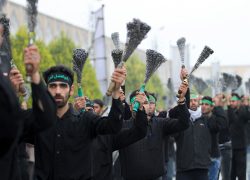Although I’ve never had the privilege of meeting Ali Akbar Parvaresh, I feel a deep connection to him. It’s as if he’s the root from which all cultural activities in Isfahan have grown. He embodied a profound understanding of meaning and knowledge, a strong connection to Shia religious principles, extensive experience in education, a history of political activism, a talent for organizational design, and a dedicated commitment to the Iranian Islamic Revolution. His independence of thought and strong personality are truly remarkable.
To understand the political character of Parvaresh, we can examine some of the traits he himself emphasized, such as Islamic ethics, a willingness to seek counsel, the ability to inspire others, supervision, the preservation of independence and freedom. Certain pivotal moments in his political life also provide valuable insights into his character.
His involvement with the Hojjatieh Society and subsequent disassociation, his speeches in 1957, his party activities, official roles such as membership in the Assembly of Experts, the Islamic Consultative Assembly, and the Ministry of Education, his interactions with governments following Imam Khomeini’s passing, and finally, his return to Isfahan in his later years, all offer valuable clues to his political persona.







